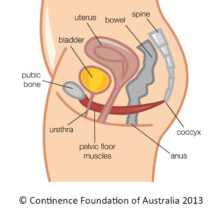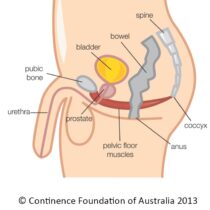WHY See A Pelvic Floor Physiotherapist?
Never heard of a pelvic floor physio? You’re not alone, I commonly get asked what it is that a pelvic floor physio does and when I explain my role there are often lots of follow-up questions… “How does physio treat X…?”, “How can you help with Y…?”, “Oh, I didn’t know physio treated Z”.
Read on to find out a little more 🙂
What are the pelvic floor muscles?
The pelvic floor are the muscles that sit at the base of your pelvis, like a hammock or funnel.
They attach to your pubic bone at the front and tail bone at the back.


The muscles of the pelvic floor have several functions including:
- Maintaining continence of your bladder and bowel.
- Relaxation to allow for complete emptying of your bladder and bowel.
- Organ support for your pelvic organs.
- A role in sexual function in both males and females.
- A wider role in the core musculature.
What is a pelvic floor physiotherapist?
A pelvic floor physio is a physiotherapist trained to assess and treat conditions that may arise due to changes in the pelvic floor muscles. There are several different presentations and symptoms that may arise due to pelvic floor muscle dysfunction. Common symptoms include:
- Loss of urine or bowel control due to activity or exercise.
- Urinary or fecal urgency (busting to get to the toilet).
- Loss of urine or bowel control due to this urgency.
- A heaviness or bulge sensation (prolapse).
- Pain with intercourse (any gender)
- Erectile dysfunction (male anatomy).
- Ejaculatory issues (male anatomy).
- Difficulty emptying your bladder or bowel.
- Pelvic pain, including:
- Low back, inner thigh or abdominal pain.
- Bladder pain.
- Perineal pain.
- Pain in the vulva (female anatomy).
- Pain in the penis or scrotum (male anatomy).
Why would these symptoms occur?
Dysfunction of the pelvic floor muscles could cause you to experience one or more of the above symptoms. This may be due to weakness, overactivity (tightness) or poor relaxation of the pelvic floor muscles, depending on your presentation.
Weakness can arise for several reasons, including childbirth, injury or the natural ageing process. Whereas overactivity may arise due to tension being held in the pelvis, perhaps due to stress or poor relaxation.
How can pelvic floor physiotherapy help?
A pelvic floor physiotherapist will ask you lots of questions about your pelvic floor symptoms to understand what may be causing the issues. This will include information on your bladder, bowel and sexual function. Your physio is then likely to assess your pelvic floor muscles to determine your muscle strength, tone and relaxation. Additionally, further assessment specific to your presentation are likely to be performed. Everyone is different, so this part is individualised. This may include bladder diaries, bowel diaries, pain diaries or further testing of other muscles / joints that may be contributing to your presentation.
Following this assessment, a personalised and individualised program will be implemented to start your pelvic rehabilitation. This may include pelvic floor exercises, breathing techniques, manual muscle release, education and / or pain management strategies. Together we will target the areas that need improvement, always ensuring that we are working towards your goals.
Please be in touch if you would like to learn more ?
Jess
Email: info@18physio.com.au
Phone: 0458789818

